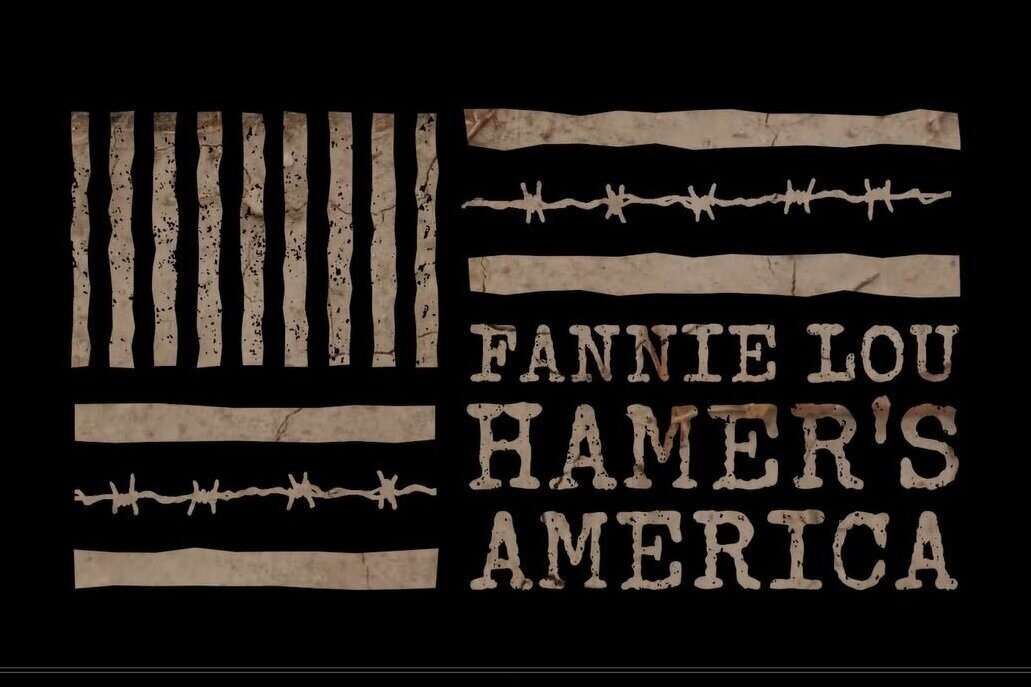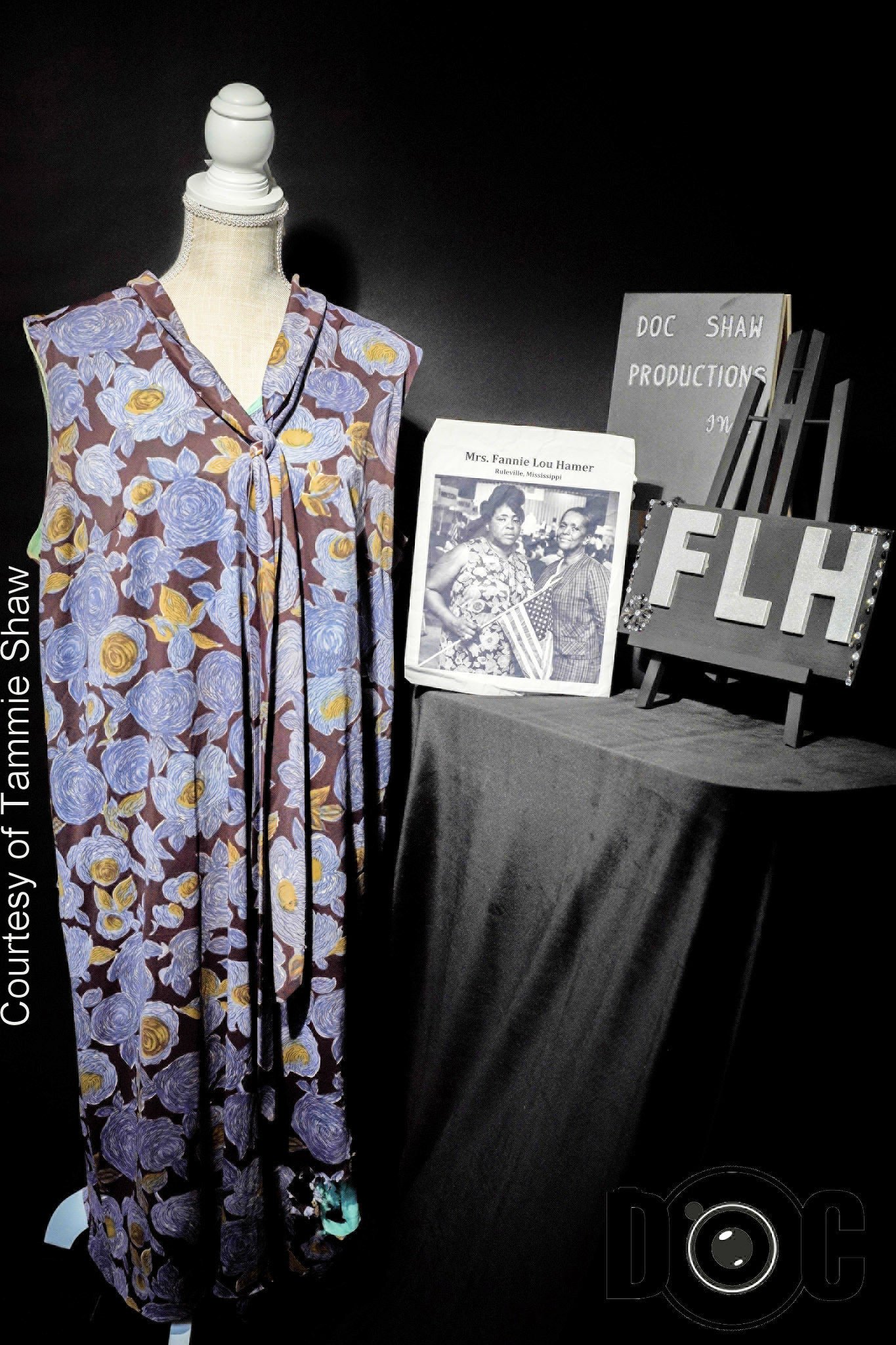
The Fannie Lou Hamer Online Museum
Welcome! With this page, we will share personal items and artifacts either belonging to or related to the work of the great human rights activist, Fannie Lou Hamer. If you have materials you would like to share, please contact us at flhamerica@gmail.com.
The Tammie S. Barber Shaw Collection Donated by the late Letha Mae Sanders Barber
“My mother met the renowned Mrs. Fannie Lou Hamer when she began playing for Williams Chapel Missionary Baptist Church in the 1950's. Mother was hired as the pianist. She accompanied Mrs. Hamer when she led songs in the William Chapel Missionary Baptist Church choir and when she sung solos in the community churches. They became the best of friends and remained friends even after Mrs. Hamer's death because "Fannie Lou's" name ranged in mother's mouth for years. Even though, Mrs. Hamer, was also 17 years older than my mother, they acted more like sisters. When Mrs. Hamer didn't call her "Letha", she called her "Baby Sis."
My mother told me that when I was about 2 months old, some KKK members fired many shots in one of the members of William Chapel M.B. Church house to try and kill Mrs. Fannie Lou for trying to register to vote. The members were Bro. Joe and Sis. Mary Tucker. She said the her ,my father and others had already helped Mrs. Hamer to get out town.
My mother was a teacher in the Sunflower County School District during the 1960's and the white superintendent called all of the colored school teachers in and told them if he heard tell of them working with these so called "Freedom Rides" in any way, they would lose their jobs on the spot! My mother was afraid, so told Mrs. Hamer when she came back to town and she understood. Most of their public associations were in the churches. See at that time in the Ruleville area, there were many blacks carrying back information to the plantation owners and the police about the Voter Rights meetings. Many couldn't write but they could tell!
When Mrs. Hamer needed to practice on a song, they would stay and practice after church in the choir stands or my mother would go and pick her up later on Friday nights because we had a piano at home. My mother and Mrs. Hamer would sing Zion Song til up in the wee hours of the night. Then my mother would drive her back home before daybreak Saturday morning.”
“My mother and Mrs. Hamer could wear the same size clothes, but was different in height and shoe sizes. My mother would let Mrs. Hamer borrow dresses for big meetings with the Student Nonviolent Coordinating Committee (SNCC) and the Mississippi Freedom Democratic Party (MFDP) conferences.
My mother let Mrs. Hamer wear this particular dress that she has worn before to different churches. And when the news media took pictures of Mrs. Hamer in this dress and put it on TV and in magazines, people started asking my mother if that was her dress Mrs. Hamer had on. My mother denied the dress, hid it in the bottom of the closet and never wore it again. Mother remembered what her white superintendent had said. She couldn't afford to lose her job with three children and a husband. Mrs. Hamer and my mother would only make signs, talk "Pig Latin" and make gestures about the dress but never verbally discussed it in our presence.”
Fannie Lou Hamer and Ella Baker at the Democratic National Convention in August 1964. Hamer is wearing the floral print dress.
Hamer wearing the floral dress at another event.
Floral dress worn by Fannie Lou Hamer in the 1960s.
The floral dress Hamer wore as loaned by Letha Sanders Barber.
“After my mother heard Mrs. Hamer's speech at the Credentials Committee of the Democratic National Convention in Atlantic City, New Jersey on August 22, 1964 on TV, my sister told me that my mother shouted "Thank you Jesus” all day long because she had helped her write the speech early one Saturday morning after they had practiced on some solos. Mother said one of those songs was, "When I've gone the Last Mile of the Way!" But after Mrs. Hamer spoke to the DNC, mother said, "Fannie Lou loved to sing, May the Work I've Done Speak for Me. She spoke ya'll!!"
After the Civil Rights Act of 1964 was passed and the Voting Rights Act of 1965 was passed, the Blacks in Ruleville were convinced of the song that Mrs. Fannie Lou Hamer was singing, "There's A Brighter Day Ahead!" In the late 1960s, the Sunflower County School District had a new superintendent, Herbert Hargett, and the tension in our house had a 360 degree turn around. Mrs. Fannie Lou and my mother sung even louder! They would wake me up singing.
Mrs. Hamer would look out for my mother. She provided food for us and clothes for us because she knew Black school teachers didn't make a lot of money. Mrs. Hamer was hired as the field secretary for SNCC (Student Non-Violent Coordinating Committee). Mrs. Hamer talked to my mother one night in 1965, and told her that she had recommended her to help with plans for a Head Start Program in Ruleville - to help our children learn. My mother had to go to Chicago, Illinois for training at Chicago State College (now Chicago State University).
In 1967, Mrs. Hamer's husband, "Mr. Pap" would pick me up from home and carry me to the Head Start Center at William Chapel M.B. Church. That program helped my mother with not having to pay a baby sitter and helped me with an early start in education.
I remember in September of 1974, when my sister turned 18 years of age, Mrs. Hamer came by the house early that morning and said "Letha, send them children out of that house, we're going to register to vote. My sister and brother came out of the house, jumped off the porch, ran and got into the car with Mrs. Fannie Lou.
The last project I remember my mother working on was when she helped organized the Fannie Lou Hamer Day on Sunday, October 31, 1976 held at the Ruleville Central High School Gymnasium. That was a great day for Mrs. Fannie Lou Hamer. Those were time when the "village" helped to raise the children!
Letha Mae Sanders Barber and Fannie Lou Townsend Hamer are both gone now, but ‘Walking The Milky White way!’” - As told by Tammie S. Barber Shaw
Mrs. Letha Mae Sanders Barber
Tammie S. Barber Shaw
“My mother Letha Mae Sanders Barber was born in Ruleville, MS, on September 12, 1934, to the late Will and Sarah Gertrude King Sanders at 510 East Street (renamed East Sanders Lane).
Letha Mae (Baby Sis. as many called her) was Ruleville's greatest Black historian. Her mother (Sarah G. K. Sanders) opened the first Black kindergarten in the Ruleville area. The G. K. stood for Gertrude King and Great Kindergarten. Sarah was a pianist and she taught my mother, Letha Mae, how to play the piano. At the age of 17, my mother was playing for churches in the Delta areas (Ruleville, Cleveland, Doddsville, Dockery, Drew, etc.) to help pay for her college education. She played in cities, towns and on plantations.”
A belt belonging to Fannie Lou Hamer.
Fannie Lou Hamer's pressing comb and shawl and a handkerchief made for her by Mrs. Letha Mae Sanders Barber.
Earrings and pin.
Fannie Lou Hamer's jewelry box and jewelry collection.
Jewelry.
Jewelry and box.
Necklaces.
Jewelry.
Tammie S. Barber Shaw and her son, Doc Shaw. All photos were taken by Doc Shaw Productions. Contact: tammiesshaw@gmail.com
















